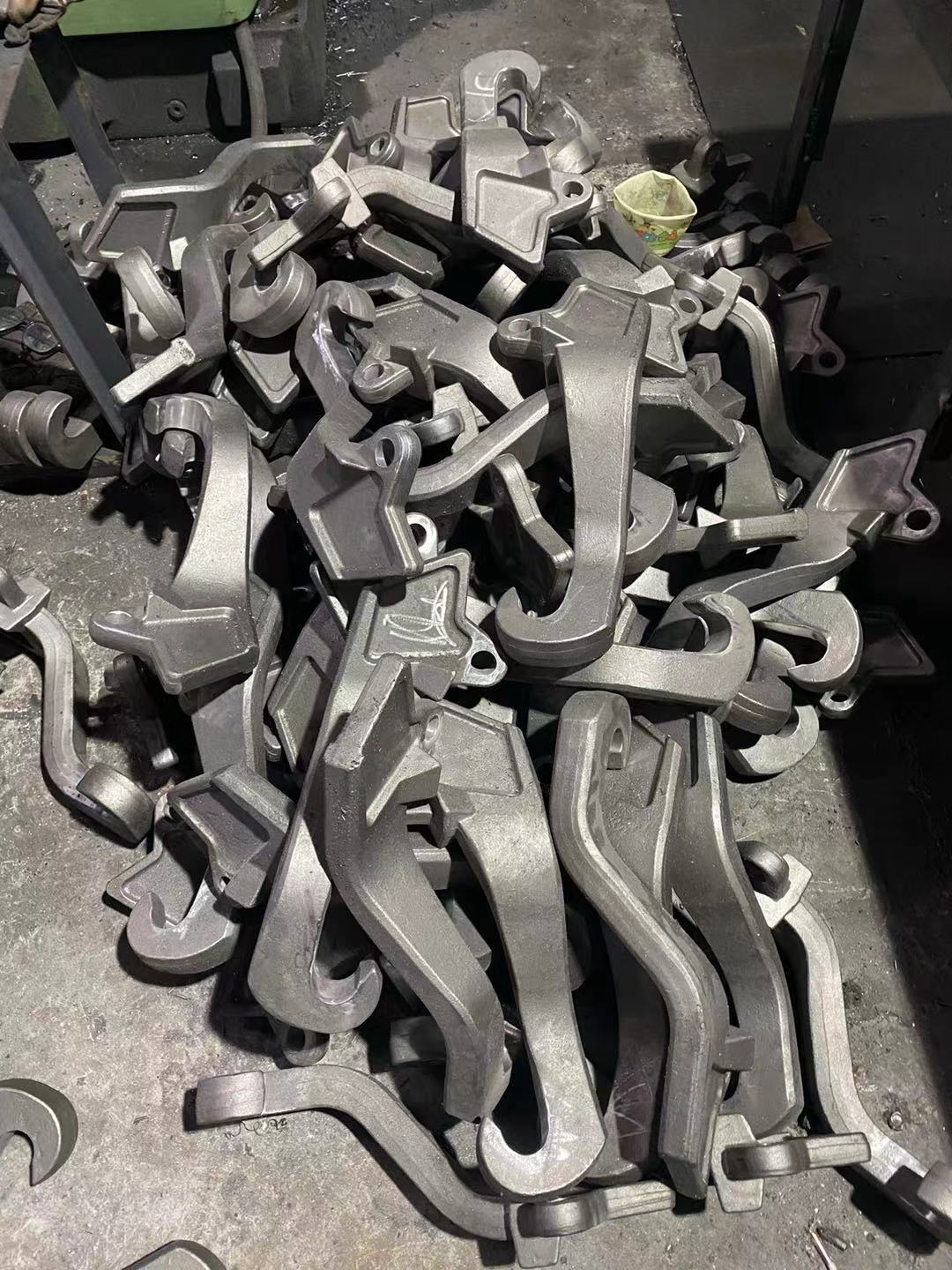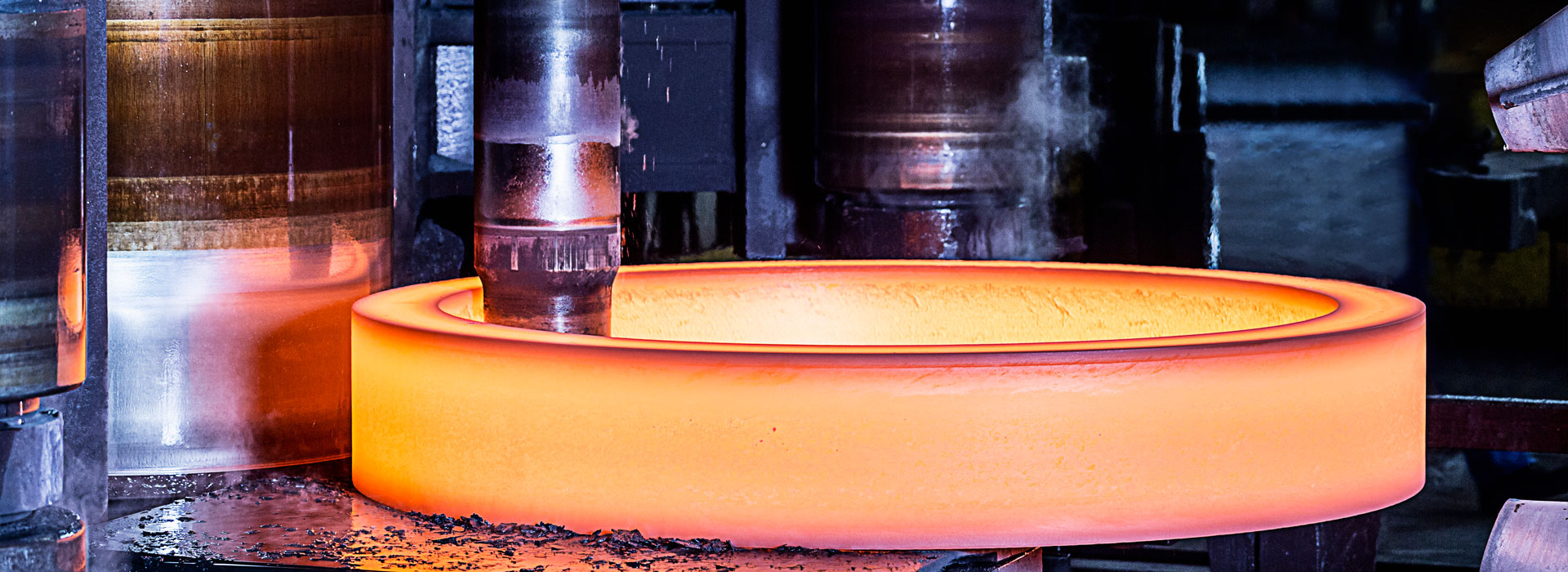Characteristics and applications of forged metals
2022-10-28
Advantages:
The metal mold cooling speed is faster, the casting structure is more compact, can be strengthened by heat treatment, the mechanical properties of sand casting is about 15% higher.
Metal mold casting, casting quality is stable, surface roughness is better than sand casting, the rejection rate is low.
Working conditions are good, productivity is high and workers are easy to master.
Disadvantages:
The metal type has high thermal conductivity and poor filling capacity.
The metal type itself is impermeable. Appropriate measures must be taken to exhaust effectively.
The metal type is non - yielding, easy to crack and deformation during solidification.
Sand forging:
Sand casting has a wide range of adaptability, small, large, simple, complex, single, large quantities can be used. Sand is more refractory than metal, so materials with higher melting points, such as copper alloys and ferrous metals, are also used in this process.
Mould for sand casting, generally made of wood, commonly known as wood mould. In order to improve the dimensional accuracy, the aluminum alloy mold or resin mold with long life is often used. Although the price has been improved, but it is still much cheaper than the metal mold casting mold, in small batch and large production, the price advantage is particularly prominent.
Metal forging:
When using metal mold casting, we must consider the following factors: long manufacturing cycle, high cost, not suitable for single piece, small batch production; It is not suitable for casting complex shapes (especially the inner cavity), thin walls and large castings (the mold of the metal type is limited by the size of the mold material and the capacity of the cavity processing equipment and casting equipment, so the metal type is not suitable for the production of particularly large castings). The mold cost is more expensive than the sand mold, and it is cheaper than the die casting.
Gravity forging:
It is widely used in the production of various non-ferrous castings, but the metal mold casting also has some disadvantages, such as low metal utilization rate, difficult casting of thin-walled complex castings, and lower casting structure density than pressure casting.
High pressure forging:
Because the liquid metal in the process of filling the cavity at high pressure and high speed, inevitably the air in the cavity is wrapped in the casting, forming subcutaneous pores, so aluminum alloy die casting is not suitable for heat treatment, zinc alloy die casting is not suitable for surface spray (but can be spray paint). Otherwise, the internal pores of the casting will be thermally expanded and cause the casting to deform or bubble when heated by the above treatment.
The mechanical cutting allowance of die casting should also be smaller, generally about 0.5mm, which can not only reduce the weight of casting, reduce the cutting amount to reduce the cost, but also avoid penetrating the surface dense layer, exposing the subcutaneous pores, resulting in the scrap of the workpiece.
Due to the loose interior of die casting parts, poor plasticity and toughness, it is not suitable for manufacturing bearing impact load parts. The wall thickness of the casting is uniform, and 3~4mm thin-wall casting is appropriate, and the maximum wall thickness should be less than 6~8mm to prevent shrinkage cavity and other defects. Avoid machine addition to prevent internal holes from being exposed.
Low pressure forging:
The liquid metal filling under the action of pressure can improve the fluidity of liquid metal, good formability of the casting, is conducive to the formation of clear outline, smooth surface of the casting, for the forming of large thin-wall castings is more favorable; The casting crystallizes and solidifies under the action of pressure, and can be fully fed, so the casting has dense structure and high mechanical properties; The process yield of liquid metal is improved. Generally, riser is not needed, so that the yield of liquid metal is greatly increased, and the yield can reach 90%. Good working conditions, high production efficiency, easy to realize mechanization and automation, is also the outstanding advantages of low pressure casting.
Low pressure casting has a wide range of application to alloy grades and can be basically used for all kinds of casting alloys. Not only for casting non-ferrous alloys, but also for cast iron, cast steel. Especially for easily oxidized non-ferrous alloys, it shows its superior performance, that is, it can effectively prevent the metal liquid from producing oxidized slag in the pouring process. Low pressure casting has no special requirements for the casting material.
The metal mold cooling speed is faster, the casting structure is more compact, can be strengthened by heat treatment, the mechanical properties of sand casting is about 15% higher.
Metal mold casting, casting quality is stable, surface roughness is better than sand casting, the rejection rate is low.
Working conditions are good, productivity is high and workers are easy to master.
Disadvantages:
The metal type has high thermal conductivity and poor filling capacity.
The metal type itself is impermeable. Appropriate measures must be taken to exhaust effectively.
The metal type is non - yielding, easy to crack and deformation during solidification.
Sand forging:
Sand casting has a wide range of adaptability, small, large, simple, complex, single, large quantities can be used. Sand is more refractory than metal, so materials with higher melting points, such as copper alloys and ferrous metals, are also used in this process.
Mould for sand casting, generally made of wood, commonly known as wood mould. In order to improve the dimensional accuracy, the aluminum alloy mold or resin mold with long life is often used. Although the price has been improved, but it is still much cheaper than the metal mold casting mold, in small batch and large production, the price advantage is particularly prominent.
Metal forging:
When using metal mold casting, we must consider the following factors: long manufacturing cycle, high cost, not suitable for single piece, small batch production; It is not suitable for casting complex shapes (especially the inner cavity), thin walls and large castings (the mold of the metal type is limited by the size of the mold material and the capacity of the cavity processing equipment and casting equipment, so the metal type is not suitable for the production of particularly large castings). The mold cost is more expensive than the sand mold, and it is cheaper than the die casting.
Gravity forging:
It is widely used in the production of various non-ferrous castings, but the metal mold casting also has some disadvantages, such as low metal utilization rate, difficult casting of thin-walled complex castings, and lower casting structure density than pressure casting.
High pressure forging:
Because the liquid metal in the process of filling the cavity at high pressure and high speed, inevitably the air in the cavity is wrapped in the casting, forming subcutaneous pores, so aluminum alloy die casting is not suitable for heat treatment, zinc alloy die casting is not suitable for surface spray (but can be spray paint). Otherwise, the internal pores of the casting will be thermally expanded and cause the casting to deform or bubble when heated by the above treatment.
The mechanical cutting allowance of die casting should also be smaller, generally about 0.5mm, which can not only reduce the weight of casting, reduce the cutting amount to reduce the cost, but also avoid penetrating the surface dense layer, exposing the subcutaneous pores, resulting in the scrap of the workpiece.
Due to the loose interior of die casting parts, poor plasticity and toughness, it is not suitable for manufacturing bearing impact load parts. The wall thickness of the casting is uniform, and 3~4mm thin-wall casting is appropriate, and the maximum wall thickness should be less than 6~8mm to prevent shrinkage cavity and other defects. Avoid machine addition to prevent internal holes from being exposed.
Low pressure forging:
The liquid metal filling under the action of pressure can improve the fluidity of liquid metal, good formability of the casting, is conducive to the formation of clear outline, smooth surface of the casting, for the forming of large thin-wall castings is more favorable; The casting crystallizes and solidifies under the action of pressure, and can be fully fed, so the casting has dense structure and high mechanical properties; The process yield of liquid metal is improved. Generally, riser is not needed, so that the yield of liquid metal is greatly increased, and the yield can reach 90%. Good working conditions, high production efficiency, easy to realize mechanization and automation, is also the outstanding advantages of low pressure casting.
Low pressure casting has a wide range of application to alloy grades and can be basically used for all kinds of casting alloys. Not only for casting non-ferrous alloys, but also for cast iron, cast steel. Especially for easily oxidized non-ferrous alloys, it shows its superior performance, that is, it can effectively prevent the metal liquid from producing oxidized slag in the pouring process. Low pressure casting has no special requirements for the casting material.
this is good forgings produced by tongxin precision forging company:

X
We use cookies to offer you a better browsing experience, analyze site traffic and personalize content. By using this site, you agree to our use of cookies.
Privacy Policy



